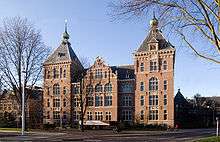Royal Tropical Institute
| Tropeninstituut | |
 Front view in 2009 | |
| Established | 1864 |
|---|---|
| Location | Mauritskade 63, Amsterdam, The Netherlands |
| Coordinates | 52°21′46″N 4°55′21″E / 52.362692°N 4.922517°E |
| Public transit access |
Alexanderplein GVB tram lines 9, 10, 14 |
| Website | www.kit.nl |
The Royal Tropical Institute, Dutch: Koninklijk Instituut voor de Tropen (KIT) is a foundation located in Amsterdam, The Netherlands, that studies tropical cultures worldwide.
History
The institute's history goes back to 1864, when it began in Haarlem as the Colonial Museum, founded to house the collection of artefacts brought back from the Dutch colonies in the East (esp. Dutch East India) by Frederik Willem van Eeden (botanist). Its mission also included the scientific study of products derived from the colonies and improving trade and production.
The collection grew rapidly. In 1910, the Vereeniging Koloniaal Institute was founded in Amsterdam, and in 1926 the museum's collection was moved there. In 1931 it hosted the World Social Economic Conference organised by the International Institute of Industrial Relations.[1]
During World War II, the German occupying forces housed the Grüne Polizei in the institute; at the same time, owing to the complicated architecture of the building (at one time the largest building in the city), the institute was a hotbed of resistance—it housed weapons and radios, and even Dutchmen hiding from the Germans: the grandson of Hendrikus Colijn, resistance fighter Hendrik Colijn, worked there under the alias Colijn, and when the building was searched by the Germans in 1944 he escaped through the labyrinthine passages in the attic.[2]
In 1950, after Dutch decolonization, the institute's mission changed, and its broadening interest, now in tropical cultures in general, was reflected with a name change, to the current Royal Tropical Institute. Today, the collection is housed in the Tropenmuseum, in the same building, with the entrance on the Linnaeusstraat.
As of May 2012, the institute's annual budget was over €40 million. In 2011 the Ministry of Foreign Affairs (Netherlands) had announced it would cease its €20 million annual subsidy, a decision appealed by the institute to the Dutch Council of State.[3]
As a result of the Dutch government's withholding of subsidy, the entire collection of books and magazines (the Tropenbibliotheek) had to be done away with. Parts of the collection were given to different institutions in the Netherlands, the so-called heritage collection and the colonial and modern map collections were placed at Leiden University Libraries. In October 2013 the Bibliotheca Alexandrina announced it would take in some 400,000 books and 20,000 magazines that otherwise would have been destroyed.[4][5]
References
- ↑ Alchon, Guy (1992). "Mary Van Kleeck and Scientific Management". In Nelson, Daniel. A Mental Revolution: Scientific Management since Taylor. Columbus: Ohio State University Press.
- ↑ Teuwissen, Lambert (5 May 2012). "Weggestopt tussen schaamgordels". Nederlandse Omroep Stichting. Retrieved 12 May 2012.
- ↑ "Tropeninstituut in beroep bij Raad van State". Historiek.nl. 11 May 2012. Retrieved 12 May 2012.
- ↑ Heijmans, Toine (31 October 2013). "Collectie Tropeninstituut gered door Egyptenaren". de Volkskrant (in Dutch). Retrieved 31 October 2013.
- ↑ ""KIT Information & Library Services", ''Royal Tropical Institute.'' On line". Kit.nl. Retrieved 2014-05-03.
External links
| Wikimedia Commons has media related to KIT. |